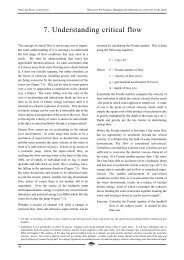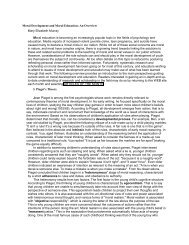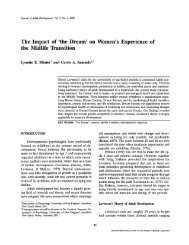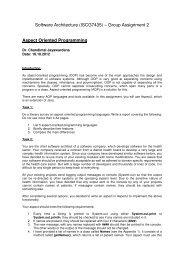WHAT POSTFORMAL THOUGHT IS, AND WHY IT MATTERS
WHAT POSTFORMAL THOUGHT IS, AND WHY IT MATTERS
WHAT POSTFORMAL THOUGHT IS, AND WHY IT MATTERS
You also want an ePaper? Increase the reach of your titles
YUMPU automatically turns print PDFs into web optimized ePapers that Google loves.
328 MICHAEL LAMPORT COMMONS <strong>AND</strong> SARA NORA ROSS<br />
People who move through the postformal stages find there are interpersonal<br />
and personal benefits. Blaming is reduced as relationships are conducted and<br />
viewed in more equitable terms. The struggle for independence and dependence<br />
is integrated into a more functional interdependence in which contributions to<br />
the needs and preferences of others is a normal part of non-strategic interaction.<br />
Conflicts are addressed within larger, de-personalized frameworks of dialogs to coconstruct<br />
workable solutions. Family and other system counseling, consulting, and<br />
coaching methods operationalize the interdependence of members of the system.<br />
The importance of postformal thought for science, mathematics, and the humanities<br />
is great. By using postformal stages, one can analyze what it takes to<br />
advance these fields. One can also find out how various ways of promoting postformal<br />
development within these fields is working. Some measure of how difficult are<br />
the tasks at hand in higher education and research can be obtained, along with examinations<br />
of what organizational arrangements promote postformal approaches<br />
and solutions to difficult problems. The work can begin to estimate what resources<br />
some problems require to keep a society, organizations, and a person competitive.<br />
No less important, better understanding of the history of science, mathematics,<br />
and the arts would develop.<br />
Stage of performance might be used to evaluate the effect of a culture on social,<br />
political, and educational development (Bowman, 1996; Commons, Krause, et al.<br />
1993; Commons and Rodriguez, 1990, 1993). An important social benefit is that<br />
postformal development is associated with increased innovation. Society might be<br />
organized to produce and pay off the acquisition of postformal performance. As social<br />
perspective-taking skills increase with these stages, the plight of disadvantaged<br />
persons, immigrants, and refugees should improve due to gradual implementation<br />
of more equally distributed quality education and more just social and economic<br />
policies and practices. Social benefits of postformal capacities may transform how<br />
urban, rural, organizational, and international issues can be addressed. Finally,<br />
postformal thought—and fostering its pervasive development—could matter a<br />
great deal if the future of human and other species matters.<br />
NOTES<br />
1. This stage was introduced by Herb Koplowitz (personal communication, 1982). He suggested that<br />
metasystems and general systems must operate on systems while we were working on a chapter of<br />
his at Dare Institute.<br />
2. For many articles on this subject, see www.integralleadershipreview.com<br />
REFERENCES<br />
Bowman, A. K. 1996. The relationship between organizational work practices and employee<br />
performance: Through the lens of adult development. Ph.D. dissertation, The<br />
Fielding Institute.<br />
Commons, M. L., Krause, S. R., Fayer, G. A., and Meaney, M. 1993. Atmosphere and stage<br />
development in the workplace. In Development in the workplace, Eds. Demick, J., and<br />
Miller, P. M., 199–220. Hillsdale, NJ: Lawrence Erlbaum.
















